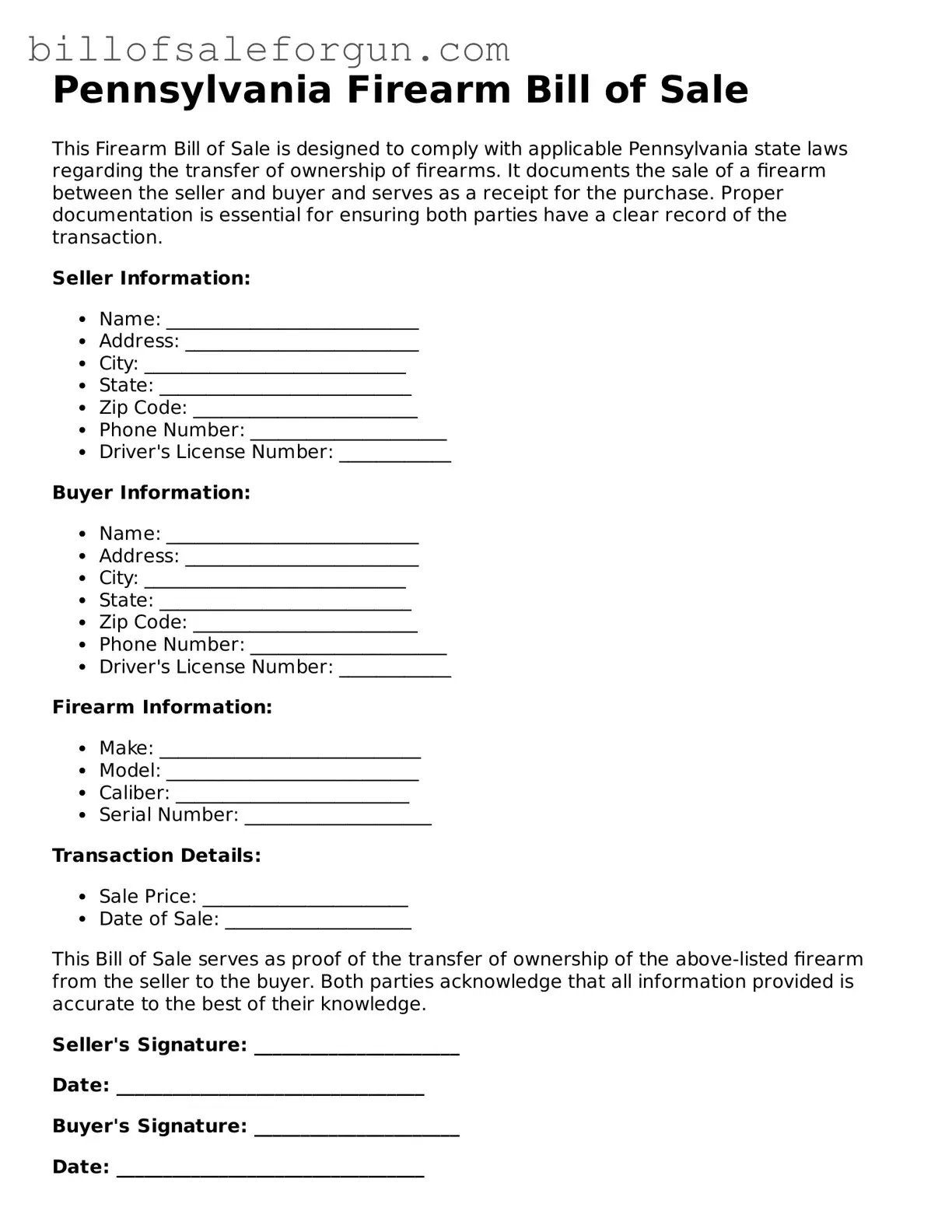Similar forms
The Pennsylvania Firearm Bill of Sale form shares similarities with a standard vehicle bill of sale. Both documents serve as proof of transfer of ownership from one party to another. In each case, the seller provides details about the item being sold, including its make, model, and identification number. This ensures that there is a clear record of the transaction, which can be useful for future reference or in the event of disputes. Just as a vehicle bill of sale may include information about the condition of the vehicle, a firearm bill of sale may also note the condition of the firearm being sold.
Another document akin to the Pennsylvania Firearm Bill of Sale is the personal property bill of sale. This form is used for the sale of various types of personal property, such as furniture or electronics. Like the firearm bill of sale, it details the item being sold, including its description and any relevant serial numbers. Both documents serve as legal evidence of the transaction and can help protect the rights of both the buyer and the seller by providing a written record of the agreement.
A lease agreement is also similar in that it outlines the terms of a transaction, though it pertains to the rental of property rather than a sale. Both documents require the identification of the parties involved and the specifics of the item or property in question. Just as a lease agreement specifies the duration of the rental and payment terms, a firearm bill of sale may include information about the sale price and any warranties or guarantees made by the seller.
The sales receipt is another document that bears resemblance to the Pennsylvania Firearm Bill of Sale. A sales receipt confirms a purchase and typically includes details such as the date of sale, the item purchased, and the amount paid. Both documents serve as proof of a transaction, although a receipt is generally less formal than a bill of sale. Nonetheless, both can be important for record-keeping and may be required for warranty claims or returns.
Similar to the firearm bill of sale is the equipment bill of sale, which is used for the transfer of ownership of machinery or tools. This document outlines the specifics of the equipment being sold, including its condition and any identifying numbers. Just as the firearm bill of sale helps establish ownership and protect against future claims, the equipment bill of sale serves a similar purpose in the realm of commercial transactions.
A gift receipt can also be compared to the Pennsylvania Firearm Bill of Sale, especially when a firearm is given as a gift. While a bill of sale typically involves a monetary transaction, a gift receipt serves to document the transfer of ownership without an exchange of money. Both documents can provide clarity and serve as proof of ownership, which can be particularly important for legal reasons or for future transactions.
The warranty deed, while primarily used in real estate transactions, shares some similarities with the firearm bill of sale in that both documents transfer ownership of an item. A warranty deed guarantees that the seller has the right to sell the property and that it is free of liens. Similarly, a firearm bill of sale can assure the buyer that the seller is the rightful owner of the firearm and that it is not stolen or encumbered by legal issues.
In the realm of business, a stock transfer agreement is similar to the Pennsylvania Firearm Bill of Sale. This agreement facilitates the transfer of ownership of shares in a corporation. Both documents require clear identification of the parties involved and the specifics of what is being transferred. They serve to formalize the transaction and ensure that both parties understand their rights and obligations.
In addition to various forms of bills of sale, businesses can benefit from utilizing templates that streamline the creation of essential documents. One such resource is available at smarttemplates.net, which offers fillable employee handbooks that can aid in clarifying company policies and procedures, much like the detailed documentation found in the bills of sale discussed above.
The promissory note, while typically associated with loans, can also be compared to the firearm bill of sale in terms of documenting an agreement. A promissory note outlines the terms of repayment, while a firearm bill of sale outlines the terms of sale. Both documents create a legal obligation for the parties involved, ensuring that there is a clear understanding of what is expected from each party.
Lastly, the contract for sale is closely related to the Pennsylvania Firearm Bill of Sale. This document details the terms and conditions under which a sale will occur, including the item being sold, the price, and any warranties. While a bill of sale is often a simpler document, both serve to protect the interests of the buyer and seller and ensure that the transaction is legally binding.
